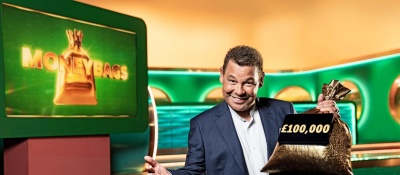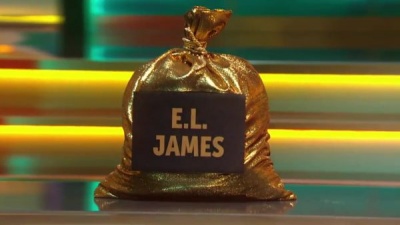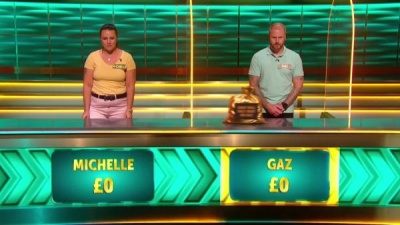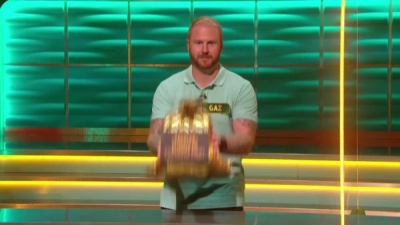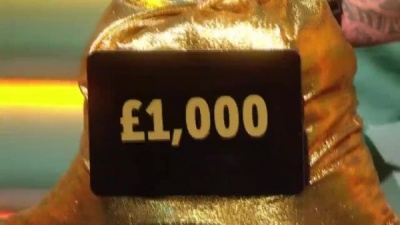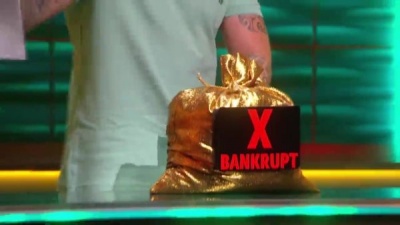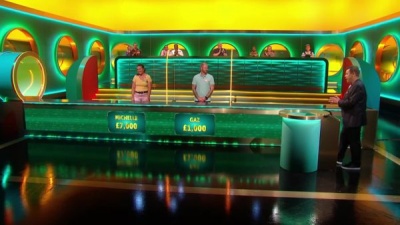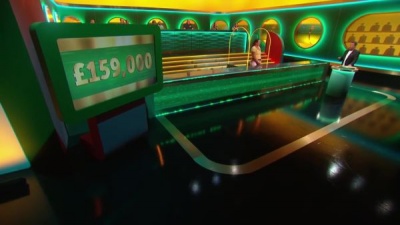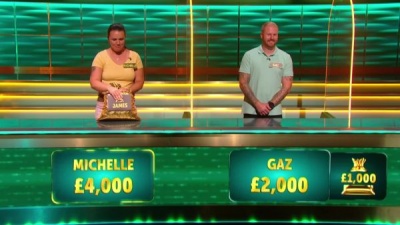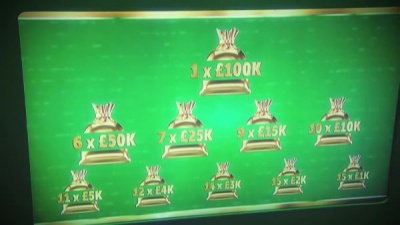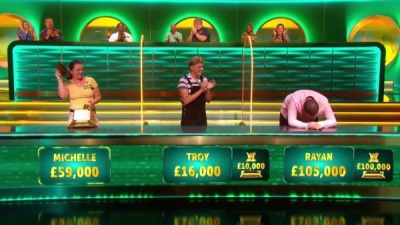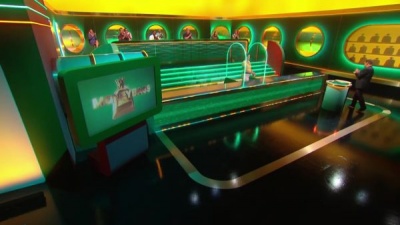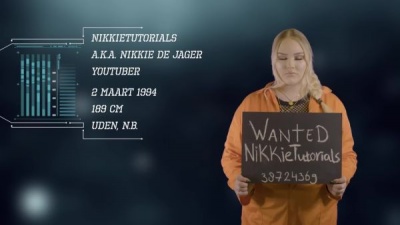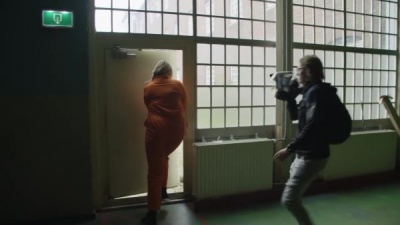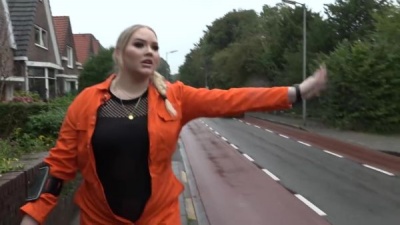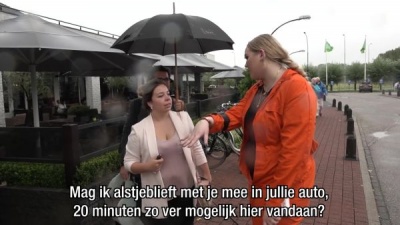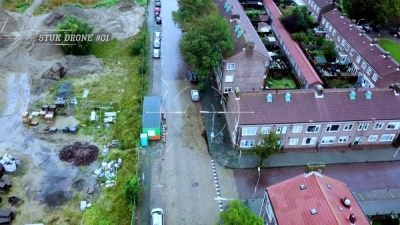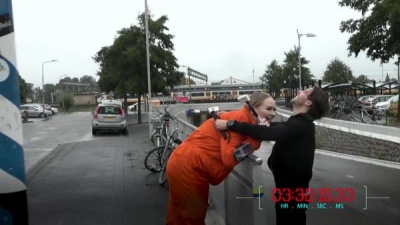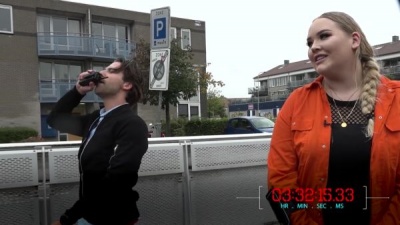Weaver's Week 2021-12-05
Last week | Weaver's Week Index | Next week
Channel 4 might have lost Friday's episode, but there's no chance of us losing our lead review this week.
Contents |
Moneybags
Youngest North for Channel 4, from 8 November
Craig Charles is the big host of a big-money quiz. The former Red Dwarf and Robot Wars star hasn't been on television much in the recent past, he's concentrated on his funk and soul show on 6 Music. Daytime television might be the dawn of his second career, just as it was the dawn of Noel Edmonds' second career in the mid-aughts.
Ah yes, Deal or No Deal, a little bit of television magic in 2005, the biggest show of 2006, but then got caught in its own mythology and became almost impenetrable to the casual viewer. Since Deal began to wind down, Channel 4 has struggled in the afternoons. Nothing on 4 at 3pm gets more than a handful of viewers. Can this big-name signing resurrect the graveyard slot? After four weeks, the jury is still out.
Moneybags is a very simple game. A category is identified, and possible answers come down a real conveyor belt. The answers are attached to bags containing money. If the answer is correct for that category, the contestant is to grab the bag. Correct answers keep the money, wrong answers are penalised. Whoever's got the most money goes on to the daily final, and potentially wins everything they've picked up today.
The actual game is a little more complex, but only a little. Craig explains the gist in twenty seconds before the title sequence, and that's all the explanation we need.
In no time at all, the game is under way. Two players are called down for their head-to-head, and smoothly explains the specific rules. In less than three minutes, we're into the game proper.
Our players see a category, for instance "Things that happened in the 1970s". The Sindy doll, did that first go on sale in the 1970s? If Michelle in "pole" position thinks it did, she's to pick up the bag. If not, she is to leave it, and Gaz in "hole" position can make his decision. Should neither player pick up the bag, it'll carry on down to Craig Charles, and he'll reveal whether it's right or wrong.
Beneath the sticky label on the front of the bag is the answer, and the amount the bag's worth. Get it right, and the player keeps the money in the bag, and advances to "pole". Get it wrong, the player is relegated to "hole" and cannot pick up the next bag. Of course, if the bag's gone all the way down to Craig, neither of these things happens, and Craig just reveals the result of that answer.
Repeat this until five correct answers – and some incorrect answers – have come down the conveyor. They'll swap to a new category after a short while. Whoever's got the most money wins the head-to-head, and goes through to the three-way final later in the show.
Craig Charles is an excellent host for this show. He's got the sparkling wit of a comedian, the improvisation skills of an actor, and the down-to-earth humour that's been a hallmark of his career. He's a natural entertainer, and turns a complex set of rules into something easy to follow. As the same players remain with us all week, we can gradually learn about them, hear more of their stories and relax along with them and Craig.
The set design is different from the norm: there's not a scrap of black to be seen. The dominant hue is a green-teal colour, with gold highlights, and lots of chevrons all pointing to the right. Why the right? That's how the conveyor travels, that's how we read. There are Perspex barriers to split the players from each other, both for health reasons and to ensure it's clear who has the chance to grab a bag at this moment.
Like Sitting on a Fortune, it's very easy to get the hang of the show. If Craig's explanation leaves some queries, the first round will eliminate any doubt. Unlike Sitting on a Fortune, we can play along at home. Bill! Grab the bag! Ben! Let it go, let it go... nooooo!
More importantly, we can shout along. Some of the fun of Moneybags comes from those brief moments of suspense: will they or won't they grab the bag. Like the coins on Tipping Point, we never quite know if something is going to happen.
The category-and-answer selections are very well done. Was the Sindy doll a child of the 1970s, or was she earlier? What about McDonalds, have they been around since that decade, or did they land in the 80s? All of the answers are plausible, we have to think. And we don't have long to think, just a few seconds between Craig reading out the answer and the player in "pole" getting to pick up the bag. Yes, there are times when the "pole" sitter takes too long to make their decision, and rejects it by default.
Each day, six players come down to have their head-to-head battle, leaving four on the sidelines. Everyone comes back each day until Friday, though daily winners don't get to play again. It's not clear what advantage to the show comes from having these winners on screen – they don't offer advice, Craig doesn't talk to them. Maybe having the winners leave the set, like on !mpossible, is the way to go.
Six come down, three win their way to the Triple-Header final. This has the same rules as before, five right answers and some wrong ones. Still played across two categories. By now, we're used to how a right answer puts you on "pole", and a wrong answer leaves you at the end. And how a wrong answer can wipe out your entire bank from across the show, and how a single Steal can swing the game.
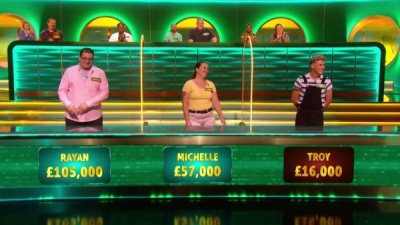 Big money's come out in the final. Troy's just collected a wrong answer and cannot pick up the next bag.
Big money's come out in the final. Troy's just collected a wrong answer and cannot pick up the next bag.
The final round is perhaps the one area where Moneybags could use a little work. The player has brought a large amount of money through to the final. The show has talked about many thousands of pounds – and now we're going to work in a few grand. Rather than the £70,000 the player might have brought through, their first question is for just £7000.
Questions in the final are slightly different. The category is still named, but now two different answers appear. One is correct and worth some of the prize pot, one is incorrect and will bankrupt the player. First right answer is for 10% of the prize total, second right answer doubles it to 20%. Third right answer takes the prize to 50%, and a fourth correct answer for all the money won. The winner can choose to leave both bags, and stick with what they've got.
We're not a huge fan of the "win a small fraction of your prize" fad going on, here and elsewhere. It feels false, like we've been baited with £LOTS and only see people win £SOME. Perhaps Moneybags might ask the contestant to play all four categories, make a selection in each, but open the bags afterwards in an order of their choice – and stop when they feel safe. But that would lead to more winners, and we'd be playing for smaller prizes...
Moneybags made a big deal out of having a million pounds available each week. What with bankrupts and losing contestants, we'd be surprised if the week's winners ever compete for more than half a million, and astounded if anyone ever wins more than £100,000. That said, something like half the shows end in a win, and wins tend to be in the range £5000-8000: very nice for daytime telly.
Those rules in full
Contestants are randomly drawn to play, and randomly assigned positions on the belt. One is in "pole", and gets first chance to grab the bag as it passes. When the contestant on "pole" doesn't pick up the bag, it can be taken by the player in the "hole". Whoever's in the "hole" can only take the bag if the "pole" contestant leaves it – if the "pole" player grabs the bag, the "hole" isn't getting it.
As we've said, correct answers are worth money. Craig mentions how a million pounds will come down the conveyor belt each week, divided across 100 correct answers. The smallest amount in a correct answer bag is £1000, most bags are worth no more than £4000, but there's one bag each week worth £100,000. Amounts are assigned to each bag at random. Correct answers also give a position advantage, it promotes a player to "pole" position, first to grab the next bag.
All these right answers are fine, but what if someone picks up an incorrect bag? The penalty is severe: they're relegated to the "hole", and blocked from taking the next bag. Even if the player knows the answer is right, their previous error counts against them.
There are further complications from special instructions. On a right answer, "Steal" allows a player to take the highest-value bag held by their opponent, and add it to their own bank. From an error, "Giveaway" is the converse, forcing the error-prone player to give their highest-value bag to their opponent. "Bankrupt" is another consequence of an error, which removes all bags from a player's account.
We think these special instructions are also allocated at random. For our tuppence, there are too many of these special instructions, almost half the bags carry a further action. Steals and giveaways can help to keep tension in the game and prevent runaway wins, but there are so many in the show that it turns into something of a lottery – the luck element is already covered by the variable bags.
Each head-to-head battle lasts for five correct answers, split across two categories. Craig will give "fair warning" when the fourth correct bag has been revealed. We never quite know how many incorrect answers there will be: across a whole show, there will be 20 correct answers and about 16 incorrect ones, but that doesn't mean there will be exactly four in each round.
Closing thoughts
Watching a week's episodes through, we've grown to appreciate Moneybags, it's a moreish show. Craig Charles is a treat to watch, and while the daily final is a bit weak, the rest of the game has come in and it looks effortless.
Has it achieved the level for another series? We don't believe so: unofficial reports say it's not moved the needle in the competitive 3pm slot, Channel 4's still getting around 300,000 viewers per day. If Channel 4 doesn't order another round, we wonder if they can reskin the game, compress it into a 30-minute slot, and let Channel 5 have a go in the Eggheads 6.30 slot.
Het Jachtseizoen
StukTV, online and for RTL and SBS6, since 2016
A couple of months ago, we promised to look at Hunting Season, an interesting Dutch show. We reckon it combines many of the elements of modern-day success Hunted and the well-loved Interceptor. And a dash of Wanted.
The game is played between the Stuk TV team – Geel de Winter, Thomas van der Vlugt, and Stefan Jurriens – and some famous Dutch celebrity. They've had singer Marco Borsato, they've had footballer Wesley Sneijder, they've had the most famous Dutch person of all Nikkie de Jager.
Starting in a current or former prison, the escapee is clad in orange overalls. They have no money, no mobile phone, no possessions at all. They do have a GPS device fastened to their arm, it will relay their position to the trackers every ten minutes.
The runner is accompanied by a cameraman, and gets a 20 minute head start on the trackers. If the runner can evade the touch of the trackers for exactly four hours, they win; should the trackers make contact with the runner, the runner loses. (A special series earlier this year featured pairs of runners, working together.)
The programme is, quite simply, an edited version of the chase to find the celebrity. Four hours chopped down to about 23 minutes. We're allowed to side with the runner, and expected to take against the intense and dour and black-clad Stuk TV hunters. Can our runner twist and turn and make their way away? How far can you get in four hours, anyway?
It's summer 2017, and we join Nikkie de Jager in Alkmaar. In prison for crimes against ugliness, or something. As soon as she's released, she encounters a problem. None of the passing cars will stop for her. Even though they don't really dress Dutch prisoners in orange boiler suits, even though there's a very obvious camera filming her, nobody will stop. In later series, they'll patch this by allowing the runners to arrange a couple of lifts, it'll make sure there's a proper programme to be had.
After ten minutes, Nikkie has got the massive distance of – 300m from the prison gate. Fortunately, she picks up a lift soon afterwards, and heads out of town to the south. If she carried on for the full four hours, she could be in Lille by the end of the programme. But driving down the Brussels ring road would not make good television. So there's another rule, you can't stay in the same vehicle for more than 20 minutes at a time.
Nikkie sweet-talks an American tourist, and again heads to the south. She spots the trackers in their van, it's got all the latest technology – satnav, routemaps, artificial intelligence, human intelligence. Well, maybe not human intelligence. The team spot someone in orange overalls, but it turns out to be a roadworker. While they're cursing their luck, they miss Nikkie driving past in the other direction.
They expect Nikkie to head further south, all the way into Amsterdam where she might lose herself in the crowds. Instead, she potters around in Beverwijk for a few moments. While leaving the town to the south, both teams see each other driving in opposite directions, and there is much wailing and gnashing of teeth.
A little later, Nikkie has made it to Haarlem – it would take 40 minutes without stopping, but both runner and trackers have stopped a lot. At one point, the trackers used another bit of tech, their drone, to see if a bit of extra height could find the car they saw Nikkie in. It doesn't. But while driving to her last location, they spot her while she's waiting at a traffic light.
The trackers stop their car, run down the middle of the dual carriageway, and come within metres of snaring their prey.
We see them through the car's rear window.
Then the lights change, and Nikkie makes her escape.
She's heading back north, back towards Beverwijk, and changes car in a shopping centre car park. The GPS locates her at the mall. Is she still there? Has she gone into the centre? No, she's changed car and has headed out to the east. (Nikkie can go into the shopping centre, or any public place. She can't go into private buildings.) By now, we're into the final hour of the contest, and Nikkie's position is being reported every five minutes, not every ten minutes.
Nikkie is dropped off by Uitgeest station, where there's four minutes to wait for the train. She doesn't know where the trackers are. Can they make the capture in time? Will Nikkie see them and try to run? She will, but she's not as fit as the trackers, and loses with just under half an hour to play.
This column's previously waxed lyrical about some classic game shows. Interceptor featured a gloriously over-the-top villain, using state-of-the-art technology to chase contestants around the countryside. Shot in real time, and only gently edited, Interceptor laid on almost all the transport for its contestants, and got them to do some task before they met up. Het Jachtseizoen differs by not having the tasks, and by editing the show heavily. The new show also uses new technology, lightweight cameras and GPS were pipe dreams in 1989.
Slightly more recently, Wanted was a game of hide and seek, played out over a whole week before the all-or-nothing final round. Smaller cameras and easier editing allowed the contest to take place in real time. There were some heavy restrictions on contestants' movements, particularly the rule against backtracking at all. Both Interceptor and Wanted were expensive to make, and didn't last long.
Het Jachtseizoen has succeeded because it's exciting television. When we start watching the episode, we never know if someone is going to escape, or if they're going to lead the trackers a merry dance, or if they're going to fail miserably. It's sharply edited highlights, so we're only seeing the interesting bits – eight hours of pursuit is boiled down to 30 minutes of action. Music is used to underscore tension, and raise the excitement. The setup could be scary and intimidating, but the show emphasises the humour and incongruity, and it's all done in good spirits.
We're not entirely sure how StukTV got its initial funding – the show looks to have a very big budget for an online show, but that could be peanuts compared to network television. Modern cameras and microphones probably make television cheaper than we think. Certainly the shows are very popular, a million viewers and more after a month online. Some episodes were bought in to air on youth channel RTLZ, and there were special episodes commissioned by Talpa's SBS6 this summer. Talpa has taken over the company, and also represents the show internationally.
Watch more
the current season on stuk.tv (worldwide)
the episode we've recapped Subs are available (auto-translated into English) if you need them.
And we find ourselves wondering. Could Het Jachtseizoen work here? Might BBC3 be interested? It's a proven format, relatively cheap to make, popular with young people, and repeatable in all sorts of slots – a pre-watershed 30 minute edit, a post-watershed 30 minute premiere, a 60-minute Extended Hunt to fill an hour at 2am.
Until then, we'll have to watch the new Dutch episodes. One's released every Saturday teatime at 1800 CET (5pm in Cardiff).
In other news
Roses d'Or were handed out by the EBU this week. Strictly Come Dancing won the Studio Entertainment rose, the only game show to win.
The TV Times Awards also took place this week. Gamey winners were:
- Favourite Game Show – Beat the Chasers (from Millionaire and The Wheel, with Epic Gameshow (sic), Family Fortunes and Rolling in It also nominated)
- Favourite Presenter – Ant and Dec (with Alison Hammond second, Joel Dommett third)
- Favourite Entertainment Show – Strictly Come Dancing (from I'm a Celebrity and The Masked Singer, with I Can See Your Voice, Saturday Night Takeaway, The Voice nominated)
- Favourite Comedy – won by Mrs Brown's Boys, with Taskmaster in third. Don't complain to us, we just report the results
- Favourite Daytime Show – won by This Morning, with Ready Steady Cook third.
- Favourite Reality Show – Gogglebox won, Bake Off second, Masterchef and Sewing Bee nominated
RuPaul's Drag Race was nominated in Favourite On-Demand Show, didn't make the top three.
Broadcast magazine handed out its Tech awards. Congratulations to the Light Bricks from Bank Balance, they lit up from inside, and changed colour, and were by far the best thing about the programme. It beat the Virtual Wall on Saturday Night Takeaway, an innovation that felt natural within a few minutes.
A word of cheer for this week's House of Games (3). When the chemistry works on this show, it really works. Simon Hickson (from Trev and Simon) was the professional comedian. Both AJ Pritchard and Jessie Cave are naturally funny, in a charming and dippy manner. The result was warm, crackling television.
This week's TV Show and Tell talks to Bobby Seagull. The star of University Challenge and Monkman and Seagull's Guide to Life talks about The Answer Trap, continuity problems, and an object that simply cannot exist.
Quizzy Mondays Mastermind was won by Kit Lane, answering on Nell Gwyn. It's a rare episode, we think only the second since the BBC revival where all four contenders have been women – and Kit appeared on that show as well. Another one-sided match on University Challenge, where Reading beat Dundee by 245-50. Michael Hutchinson answered 12 (TWELVE) starters correctly, a rare achievement.
Only Connect moved into the quarter-finals, and the Animal Lovers again beat the Apollos, recovering a deficit on the walls and then winning it on Missing Vowels. There was a question by guest setter Samuel West, from All Creatures Great and Small. Victoria had the perfect set-up to a joke: "Wham! were a group of really skilled singers and musicians." George Michael, Deon Estus, Pepsi and Shirlie, D C Lee were all great musicians. And Andrew Ridgeley.
This week, we're waiting for the Christmas specials to arrive. More4 feels our pain, and has Aussie Bake Off each teatime. Some special editions of Celebrity Antiques Road Trip include the Fingers on Buzzers hosts (BBC2, Fri). The last in the "present" series of Killer Camp (ITV2, Mon-Wed), and The Love Trap (C4, Wed).
Gareth Malone really ought to ace The Hit List (BBC1, Sat), The Wheel features Matt Baker, Gyles Brandreth, and Mr. Motivator; something for everyone there. I'm a Celebrity finishes next Sunday, the 12th, by which time the Week will have posted some Christmas history.
Pictures: Youngest North, stuk.tv, Humble Pie Productions trading as Studio Ramsay, Remarkable (part of Banijay).
To have Weaver's Week emailed to you on publication day, receive our exclusive TV roundup of the game shows in the week ahead, and chat to other ukgameshows.com readers, sign up to our Google Group.


